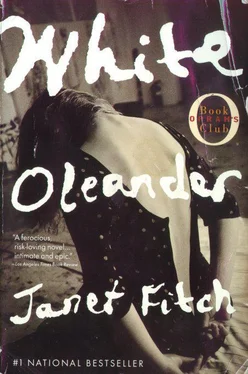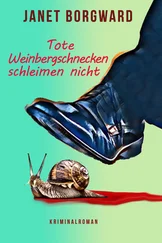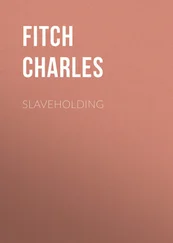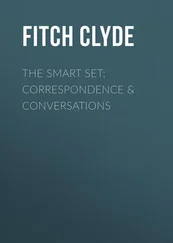Janet Fitch - White Oleander
Здесь есть возможность читать онлайн «Janet Fitch - White Oleander» весь текст электронной книги совершенно бесплатно (целиком полную версию без сокращений). В некоторых случаях можно слушать аудио, скачать через торрент в формате fb2 и присутствует краткое содержание. Жанр: Современная проза, на английском языке. Описание произведения, (предисловие) а так же отзывы посетителей доступны на портале библиотеки ЛибКат.
- Название:White Oleander
- Автор:
- Жанр:
- Год:неизвестен
- ISBN:нет данных
- Рейтинг книги:3 / 5. Голосов: 1
-
Избранное:Добавить в избранное
- Отзывы:
-
Ваша оценка:
- 60
- 1
- 2
- 3
- 4
- 5
White Oleander: краткое содержание, описание и аннотация
Предлагаем к чтению аннотацию, описание, краткое содержание или предисловие (зависит от того, что написал сам автор книги «White Oleander»). Если вы не нашли необходимую информацию о книге — напишите в комментариях, мы постараемся отыскать её.
White Oleander — читать онлайн бесплатно полную книгу (весь текст) целиком
Ниже представлен текст книги, разбитый по страницам. Система сохранения места последней прочитанной страницы, позволяет с удобством читать онлайн бесплатно книгу «White Oleander», без необходимости каждый раз заново искать на чём Вы остановились. Поставьте закладку, и сможете в любой момент перейти на страницу, на которой закончили чтение.
Интервал:
Закладка:
She smiled down at her sewing, ducking her head. She didn’t like to show her bad teeth. “It’s no sweat. I do all the work. All you gotta do is hold the towel.”
“Huff’n’puff,” Niki said. “Bunch of beachballs blowing it out the wrong end. A real laugh riot. You’ll see.” Niki broke off another chunk of hash, put it on the pin. She lit it and watched the smoke fill the glass like a genie in a lamp. When she took the hit, she broke into a coughing fit even worse than mine.
“None for me?” Sergei asked, pointing at the shot glass.
“Fuck you, Sergei,” Niki said. “When did you ever buy us any?”
But she put a little out for him anyway, and I tried to ignore the way he looked right at me as he stooped to put his lips where mine had been. But I felt my face burn right up to the hairline.
We all ate, except Rena, who smoked and drank vodka. As soon as she left the room for a moment, Sergei leaned over, broad white hands folded before him. “So, when we make love, devushka?”
“You sleazebag,” Niki said, pointing her fork at him. “I ought to tell Rena.”
“Anyway, Astrid’s got a boyfriend,” Yvonne said. “An artist. He lives in New York.”
I’d told her all about Paul Trout. I’d finally picked up his letters from Yellow Brick Road in Hollywood, on the same street where I pulled the knife on the girl who thought I was Wendy. Niki took me there after school, on the way to meeting some guys who needed a singer. I felt bad I hadn’t written to him before, I’d thought of it many times, but I was afraid. Chances were he never looked back. On the drive into Hollywood, I looked nervously at the envelope, marked Hold for Paul Trout. The hope implied. It was a mistake already. I thought of a song Rena played that I hated like death, “Love the One You’re With.” It was the tune life kept forcing on me, and yet there I was, hope fluttering like a bird in my hand.
The shop was tiny, more crowded even than Rena’s. Comic books everywhere. Niki and I leafed through the stacks. Some of the comics were jokey, like Zippy the Pinhead and old Mr. Natural . Others were dark and expressionist, Sam Spade meets Murnau. There were racks of homemade magazines full of bad poets. Comics in Japanese, many of them pornographic. Tongue-in-cheek stories of career girls and supermodels drawn in the Lichtenstein pop style. A Jewish rodent trapped in a Blackshirt paranoid nightmare. They sold everything from the standard DCs to locally drawn, Xeroxed, staple-spined ’zines. While Niki read a gangster girl tale, I went to the counter, told myself there’d be nothing for me.
A skinny guy in a burgundy bowling shirt doodled on the counter, pale arms covered with tattoos. I cleared my throat until he looked up. His eyes were pot-hazed. “I’m a friend of Paul Trout’s. Did he leave anything for me?”
He smiled a little shyly, wiping his nose on the back of his hand. “He went to New York, didn’t you hear?” He rummaged under the counter and came up with two letters, the envelopes so heavily illustrated you could barely see the Yellow Brick Road address. The outside was marked Hold for Astrid Magnussen .
“No return address?”
“He moves a lot. Don’t be surprised.”
I left one for Paul, illustrating my life on Ripple Street. Trashpicking, our living room. I didn’t know what else to do with it. He was gone.
In the corner booth at the rock’n’roll Denny’s on Sunset, I sat with Niki as she negotiated with the boys from the band, two bleached blonds and a hyperactive brunet—the drummer, I knew without asking. I was afraid to open the letters. Instead, I sketched some of the other customers. Goth girls in black tights and black ratted hair, conspiring over Diet Pepsis and double orders of onion rings. On the other side, two aging rockers in leather and studs ate their burgers; one was talking on a cell phone. It was like some kind of era-by-era fashion layout, Mohawks and ducktails and dreadlocks, polyester and platforms.
“I’m not paying to play with twelve other bands. What, are you retarded?’’ Niki was saying. “They’re supposed to pay you, not the other way around.” I sketched the blond bass player as he guiltily tongued his chin stud from the inside. The brunet spasmodically tapped on the water glasses with his knife. “You gotta play where they pay. Where you from anyway, Fresno?”
“But it’s like the Roxy, you know?” the taller blond said. He was obviously the spokesman, the eloquent one. Lead guitar. “The Roxy. It’s like the . . .”
“The Roxy,” the other blond said.
I finally worked up the nerve to open the first letter, slitting the beautiful envelope with the Denny’s dinner knife. Inside was a series of ink drawings done in Paul’s unmistakable comic book style, bold blacks and whites: Paul, walking lonely comic book streets. Paul, sitting at a Nighthawks cafe. He sees a blond girl on the street with short chopped-up hair and follows her, only to have her turn out to be somebody else. Would he ever see her again? the last caption read, as he drew at his desk, the wall covered with pictures of me.
The second envelope held a comic strip story of a prison break, three boys blasting their way out through steel doors with rocket launchers. They steal a car, the signs say Leaving L.A. They tear across the desert in the night. Next there’s a street sign in broken mosaic, it says St. Marks Place. Angular hipsters in black pass a doorway, 143. The Statue of Liberty in the background wears shades, it’s reading a comic book.
I folded the drawings, slipped them back into the envelope decorated with lightning bolts, stars, and a girl on a white horse in a comic book sky. Hold for Astrid Magnussen. If only I’d known that he would.
And now it was too late. I looked at Sergei across the table in Rena’s kitchen. He could care less about my boyfriend in New York. He didn’t even care about his girlfriend in the next room. He was just like one of Rena’s white cats—eat, sleep, and fornicate. Since the night I’d seen them together on the couch, he was always watching me with his hint of a grin, as if there were some secret we shared. “So how is your boyfriend?” he asked. “Big? Is he big?”
Niki laughed. “He’s huge, Sergei. Haven’t you heard of him? Moby Dick.”
Olivia had told me all about men like Sergei. Hard men with blue veins in their sculpted white arms, heavy-lidded blue eyes and narrow waists. You could make a deal with a man like that. A man who knew what he wanted. I kept my eyes on my broccoli and cheese.
“You get tired of waiting,” he said. “You come see me.”
“What if you’re no good?” I said, making the other girls laugh.
“Only worry you fall in love Sergei,” he said, his voice like a hand between my legs.
MY LATEST CASEWORKER, Mrs. Luanne Davis, was a middle-aged black woman in a white blouse tied in a bow at the neck and relaxed hair in a pageboy. I spotted her right off when I arrived at the McDonald’s on Sunset after school. I ordered a burger and fries and a Coke, and for once, the screaming of children in the ball pit didn’t bother me. I’d gone to Playland the night before with Niki, where she sang with one of Werner’s bands, Freeze. I carried her microphone stand, which made me a roadie, so I didn’t need an ID. Niki was the only one who could sing. She had a purring, ironical voice, she sang the way Anne Sexton read poetry. But everyone else screamed, and nobody could play, and I was still half-deaf from it.
The social worker passed a wad of letters across the sticky table to me. Such potential for damage, I didn’t even want to pick them up. I hated the sight of them, my mother’s handwriting, the crabbed lines I could see through the blue airmail envelopes. She could get seven pages per stamp, and each thin sheet weighed more than the night. They were like a kelp forest, they cast a weird green light, you could get lost there, become tangled and drown. I had not written to her since Claire died.
Читать дальшеИнтервал:
Закладка:
Похожие книги на «White Oleander»
Представляем Вашему вниманию похожие книги на «White Oleander» списком для выбора. Мы отобрали схожую по названию и смыслу литературу в надежде предоставить читателям больше вариантов отыскать новые, интересные, ещё непрочитанные произведения.
Обсуждение, отзывы о книге «White Oleander» и просто собственные мнения читателей. Оставьте ваши комментарии, напишите, что Вы думаете о произведении, его смысле или главных героях. Укажите что конкретно понравилось, а что нет, и почему Вы так считаете.












